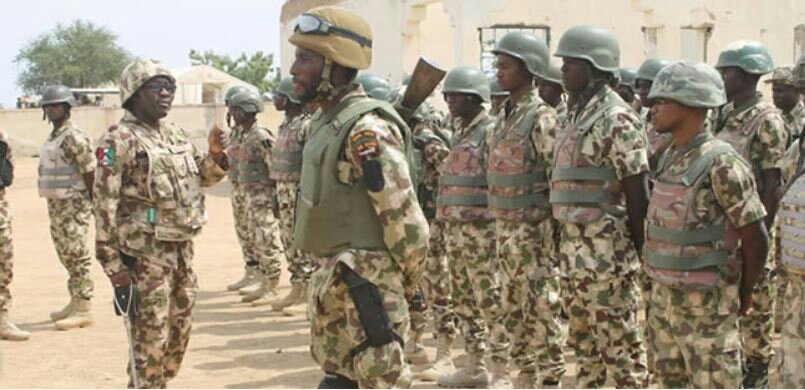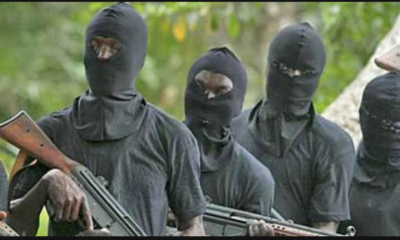News
Soldiers Lobby Against North-East Postings As Boko Haram Attacks Escalate
It was learnt that a significant number of the soldiers presently stationed in the North-East were lobbying for redeployment.

Soldiers have begun intense lobbying to escape deployments into the North-East, following the escalating wave of Boko Haram attacks on military formations in the region, Saturday PUNCH investigations have revealed.
Multiple military sources confirmed to Saturday PUNCH that as part of the fallout of the Boko Haram attacks on military formations in Metele, Kangarwa, Malumfatori and Arge areas of Borno State as well as the Buni Gari area of Yobe State in November, more soldiers were now lobbying to avoid postings to the volatile North-East region.
Also, It was learnt that a significant number of the soldiers presently stationed in the North-East were lobbying for redeployment.
A Brigadier-General who spoke on condition of anonymity because he was not authorised to speak to the media, told Saturday PUNCH that a significant number of personnel were influencing their posting against the North-East while some were deserting the military.
He said, “In the military doctrine, we have what is called cowardice. Soldiers can exhibit cowardice when they hear negative reports. Let me tell you why we have been experiencing attacks in those Lake Chad areas. Those army deployments were intentionally made around Lake Chad to block the Boko Haram’s channels of supply. The Boko Haram understands why the military are blocking their channels and they therefore ensure they keep attacking those bases to open up their own channels of supply.
“There is a way some people have been glorifying the attacks and this makes the soldiers who are there to be afraid. These are very young military officers with families and they can be afraid. Most times when I as a general say I am on my way to the North-East, I get messages from friends and families to be careful. But I am going under escort. Now, imagine soldiers who are just deployed to actually go and fight. This is why some reports are not helpful because they are escalating these attacks, glorifying the terrorists and putting fear in our soldiers. Some of these soldiers read all these online reports and they are afraid. They are now avoiding going to the North-East like a disease.
“I just came back home and learnt that one of my cousins whom I brought into the army was redeployed. He was supposed to go to the North-East. He ran away. He is in the village in the South-South riding motorcycle, because he does not want to die.
“Now, if we have such incidences all over, what will become of our security architecture? Our worries are that while the terrorists are doing theirs, so many media reports reaching soldiers in the North-East are disturbing and pulling down their morale.”
A colonel serving in Abuja also spoke on the latest development, saying personnel were now increasingly influencing their postings to avoid the North-East.
He said, “Soldiers are trained to die in the course of defending the country’s territorial integrity, but not when you die because there are no adequate equipment. The terrorists know how to strike because they have informants who leak the strengths and weaknesses of the army to them.
“Since there is no specific time frame for soldiers serving in the North-East, some of them are disgruntled and they are lobbying not to be posted there. The increasing attacks in the North-East are dampening the morale of troops and this is why the military authorities usually send the service chiefs to visit and talk to them.”
Further findings by Saturday PUNCH confirmed that a number of the soldiers serving in troubled areas of Bornu State were considering the option of deserting due to the renewed attacks by the Boko Haram insurgents.
Specifically, a soldier in the Maimalari Barracks, who spoke to Saturday PUNCH on condition of anonymity, said although the insurgents had yet to invade the area, their activities in neighbouring communities had raised concern over the safety of army personnel in the area.
The military source said some recent attacks by the insurgent groups had been focused on schools while soldiers captured by the terrorists were subjected to gruesome killings.
According to the soldier, the prevalence of these fearful developments has led to a situation where more soldiers now lobby to be redeployed out of the North-East.
The source said, “Honestly, I am even thinking of leaving (the military). They (insurgents) are coming close to the barracks. When I made an enquiry about my posting, I was told that I must complete four years (in Maiduguri); but I have spent two years. I do not know what to do.
“I will not make it (my quitting) official. I have made up my mind to go. But the problem I have is: what will I fall back to?”
The soldier added, “At first, the Boko Haram (insurgents) were in the villages. But they are coming close to the town now. And whenever they capture any soldier, they do not shoot the soldier; they just slaughter the soldier with knives.
“I know some soldiers who have blocked their posting to Bornu. They have godfathers. I also know many soldiers who influenced their posting after our training at the depot (in Kaduna). One of the female soldiers just told me that she was working to get posted to Lagos.”
A corporal, who served in the North-East between 2011 and 2016, identified only as Ben, said troops were lobbying because of inadequate weapons to defend themselves and the communities.
“You are given only AK-47 rifles to face the Boko Haram terrorists who have machine guns, GPMG, gun trucks and anti-aircraft guns. You are not going to return alive from that war. This is why some soldiers are willing to be redeployed, if it is possible.
“The terrain is not friendly. The land is desert and you need both adequate military and welfare provisions to survive. But these things are mostly not there,” Ben said.
Pattern of military postings to the North-East
According to findings by Saturday PUNCH, military postings to the North-East are done at any time during the year and there is no specific duration for troops posted to the North-East or any part of the country.
The army had posted new commanders to the North-East region at least two times this year, but the postings of soldiers are largely unannounced because of their numbers.
The Director, Army Public Relations, Brig Gen Sani Usman, confirmed that there was no specific time frame for rotation of troops deployed in the North-East, noting that soldiers could get a leave or pass from the theatre, depending on their circumstances.
Usman, in an interview with one of Punch correspondents, said some personnel in the North-East theatre of war were specialists, “whose jobs are very critical to the performance of a particular unit and formation.”
He said, “If you are talking about the duration, there is no specific time frame. However, there are provisions where soldiers are allowed to go on passes whenever the need arises. They are also allowed to go on a leave.
“The bottom line is that we are fighting a war and we are defending the territorial sovereignty of our country. I cannot speak on the longest duration anyone has stayed. It depends on the individual. It is not everyone who has duration. Military rotation has no time frame that you say, you must rotate people.”
Harvest of Boko Haram attacks on military formations
The intensive attacks by insurgents began in July 2018 with the Al-Barnawi faction of the Boko Haram and the Islamic State West African Province fighters overrunning military bases and carting away weapons belonging to the army.
In the first week of July 2018, the terrorists overran the army base in Jilli, Yobe State, where over 20 soldiers were reportedly killed. In the same week, they attacked another army location in Bama with an undisclosed number of troops going missing.
The attacks forced the Chief of Army Staff, Lt Gen Tukur Buratai, to go to the North-East on assessment visit.
The Bama attack in Kwakwa and Chingori communities was also said to have recorded the loss of 10 soldiers.
The 233 Battalion troops in the Tarmuwa LGA of Yobe State were also on July 22 ambushed by the insurgents with several military gun trucks said to have been stolen.
The aftermath of these attacks in the last week of July was that the army authorities announced the replacement of the hitherto Commander of the Operation Lafiya Dole, Maj Gen Rogers Nicholas, with Maj Gen Abba Dikko.
Yet on July 29, Boko Haram terrorists in three gun trucks attacked the army in Mairari village in the Monguno Local Government Area of Borno State, during which two soldiers were injured. Sixteen terrorists were also killed.
On September 8, the insurgents also staged an attack on an army base in Baga in the Kukawa LGA of Borno State, a day after they invaded another military base in Gudumbali, in the Guzamala LGA.
In both invasions, more than 20 soldiers were said to have been killed, although the army did not confirm the figures.
On September 13, the insurgents attacked the 145 Battalion troops’ base in Damasak, Borno State, while three days later, the insurgents ambushed troops along Bama Road in Maiduguri. The troops of 222 Battalion, 22 Brigade, were ambushed but the army was not clear on the casualty figures.
In the second week of September, the Boko Haram attacks on military bases again forced the service chiefs – the army chief and the Chief of the Air Staff, Air Marshal Sadique Abubakar – to relocate to the North-East region.
The pockets of attacks continued through October into November with the terrorists attacking an army base on October 28 in the Gashigar area of Borno State.
Three soldiers were killed in the location belonging to the 145 Battalion, when the insurgents invaded the base in 13 gun trucks.
Also, the insurgents attacked Katarko in the Gujba LGA of Yobe State on November 3. Days earlier, the terrorists had attacked the army base in Kukawa where 16 soldiers were reportedly missing after the invasion.
The most deadly attack in the last quarter of the year was on November 18 when the insurgents attacked the 157 Battalion’s base in Metele in the northern part of Borno State, with the death toll said to be more than 100 soldiers.
The army confirmed a week later that 23 soldiers died and 37 were injured in the Boko Haram’s invasion.
After Metele, however, the insurgents have attacked the military bases in Buni Gari and Gajiram, with some troops of the Nigerian Army said to have fled to Cameroon, Niger Republic and Chad to escape the superior firepower of the insurgents.
N1.8tn allocated for ’Haram fight, defence in four years
So far, the Federal Government has made budgetary allocations of about N1.806tn for the counter-insurgency war and defence generally between 2015 and 2018.
The details of the N1.806tn, which was obtained from the Budget Office of the Federation, were contained in the annual budgets of the Federal Government for the ministry.
The respective annual budgets for the four-year period were analysed by Saturday PUNCH on Thursday.
The Ministry of Defence is made up of the Nigerian Army, Nigerian Navy, Nigerian Air Force, Defence Intelligence Agency, Defence Space Agency, among others.
A breakdown of the allocations showed that the sum of N576.39bn was allocated to the Defence ministry in 2018.
This was made up of recurrent expenditure of N418.68bn while capital expenditure was N157.71bn.
In the 2017 fiscal period, the sector had total allocation of N411.48bn made up of recurrent expenditure of N96.48bn and capital expenditure of N315bn.
The 2016 and 2015 fiscal periods had total allocation of N443.07bn and N375.49bn, respectively.
These were made up of N312.21bn and N338.79bn for recurrent expenditure respectively while capital expenditure had N130.86bn and N36.7bn.
Further analysis showed that the Nigerian Army and the Nigerian Air Force got a total budgetary allocation of N1.02tn to finance their operations during the period. The Army and NAF are playing active roles in the Boko Haram fight.
An analysis of the budget document showed that out of the N1.02tn, the Army received budgetary allocation of N629.15bn for the four-year period while the Air Force got N390.85bn.
A breakdown of the N629bn showed that the sum of N224.25bn was allocated in the 2018 fiscal year made up of recurrent expenditure of N204.63bn while capital expenditure was N19.62bn.
In 2017, the Nigerian army got N155.44bn made up of N134.82bn for recurrent while N20.62bn was for capital.
In 2016, the allocation to the army was N99.63bn out of which N65.97bn was for recurrent while capital was N33.65bn.
The 2015 fiscal period had the sum of N149.83bn allocated to the Army, out of which recurrent was N144.08bn, while capital expenditure was put at N5.75bn.
For the Nigerian Air Force, the security body got N111.65bn in 2018 made up of recurrent N67.33bn and capital N44.65bn.
In 2017, the Air Force got N111.65bn; 2016 N90.71bn; 2015; N77.02bn.
Saturday PUNCH checks showed that over 80 per cent of the allocations to the Defence ministry was meant for re-current expenditure while less than 20 per cent focused on capital expenditure.
An analysis of the Budget Implementation Report obtained from the Budget Office showed that out of the Defence ministry’s capital allocation of N36.7bn for the 2015 fiscal period, the government actually released N26.09bn.
For 2016, the capital vote was put at N130.86bn out of which the sum of N97.26bn was actually released.
For the 2017 fiscal period, the government actually released a total amount of N117.68bn out of the capital budget of the defence ministry.
Military spent N9.8bn on equipment in three years
Meanwhile, findings showed that the military spent N9.797bn on purchase of military equipment between 2015 and 2017 fiscal periods.
This sum was obtained from the budgetary allocations for the acquisition of military weapons for the counter-insurgency war in the North-East within the period.
The budget documents revealed that at least N9.797bn was given to the military to buy weapons; this sum being asides other special allocations to the military to fight the insurgents.
However, the Defence ministry could not provide Saturday PUNCH with any data on military spending.
Details of the N9.797bn allocations for the three-year period showed that in 2015, the Defence Headquarters, Abuja, got N697m for the army to purchase ammunitions.
In 2016, the money budgeted for ammunition rose to N5bn, while in 2017, the army got N4.1bn.
The military could not immediately state other funds it got for the purchase of arms under Buhari administration aside from budgetary allocations, particularly for the war against insurgency in the North-East.
Meanwhile, the Federal Government had early this year paid the United States government the sum of $496m as part payment for the acquisition of 12 Super Tucano fighter jets estimated at $600m.
The jets are to be used by the Nigerian Air Force in the ongoing military operations against the Boko Haram insurgency in the North-East.
The Director of Press and Public Relations at the Defence ministry, Mr. Charles Nwodo, could not confirm whether the ministry had received the $1bn ECA funds meant for the purchase of arms.
Presidency keeps mum over military spending
The Presidency has kept mum over whether President Muhammadu Buhari will order an investigation into military spending in the last three and half years on the heels of allegations that soldiers are ill-equipped to fight the Boko Haram terrorists.
Following the November 18 Metele attacks that claimed the lives of many soldiers, various groups and eminent Nigerians have called for the probe of military spending.
The probe calls were made after some survivors of the Metele attacks alleged that the soldiers could not withstand the superior firepower of the insurgents due to lack of modern equipment.
Two of the survivors posted a video of the attacks on social media, where they lamented the alleged neglect of the troops.
There were also calls for the removal of the Service Chiefs and the Inspector-General of Police, Mr Ibrahim Idris.
However, days of efforts by Saturday PUNCH to get the Presidency’s position on the matter were fruitless.
Neither the Special Adviser to the President on Media and Publicity, Mr Femi Adesina, nor the Senior Special Assistant to the President on Media and Publicity, Mr. Garba Shehu, had responded to any of the enquiries by Saturday PUNCH as of the time of filing this report.
Saturday PUNCH had asked whether in seeking for solutions to the renewed attacks, the President would consider laying off the service chiefs in order to inject new hands into the security architecture of the country.
The newspaper also asked whether military spending would be investigated in the light of the allegations made by the survivors.
Follow us on social media:-

 Lifestyle2 days ago
Lifestyle2 days agoMan walks into hospital, removes oxygen from female patient to heal her through prayer; she passes away (Video)
-

 Love & Relationship2 days ago
Love & Relationship2 days agoWoman praises partner for loving her despite cheating and getting pregnant by someone else
-

 Sports1 day ago
Sports1 day agoMessi’s FIFA Best Player of the Year Vote revealed
-

 News1 day ago
News1 day ago“Nigerians paid N2.23tn as ransom in 12 months” – NBS







